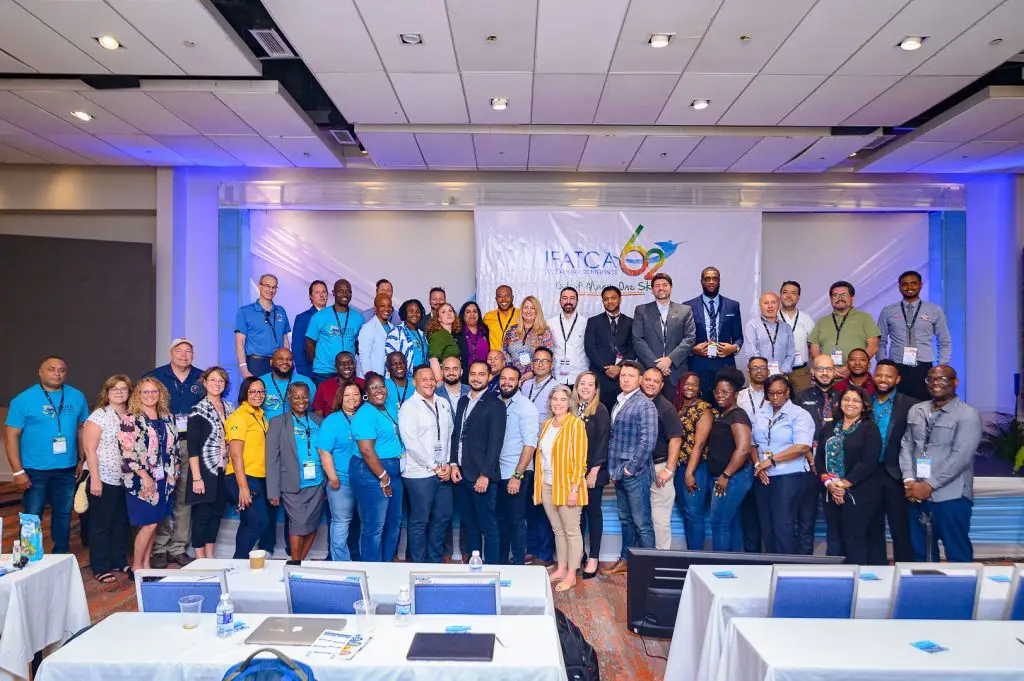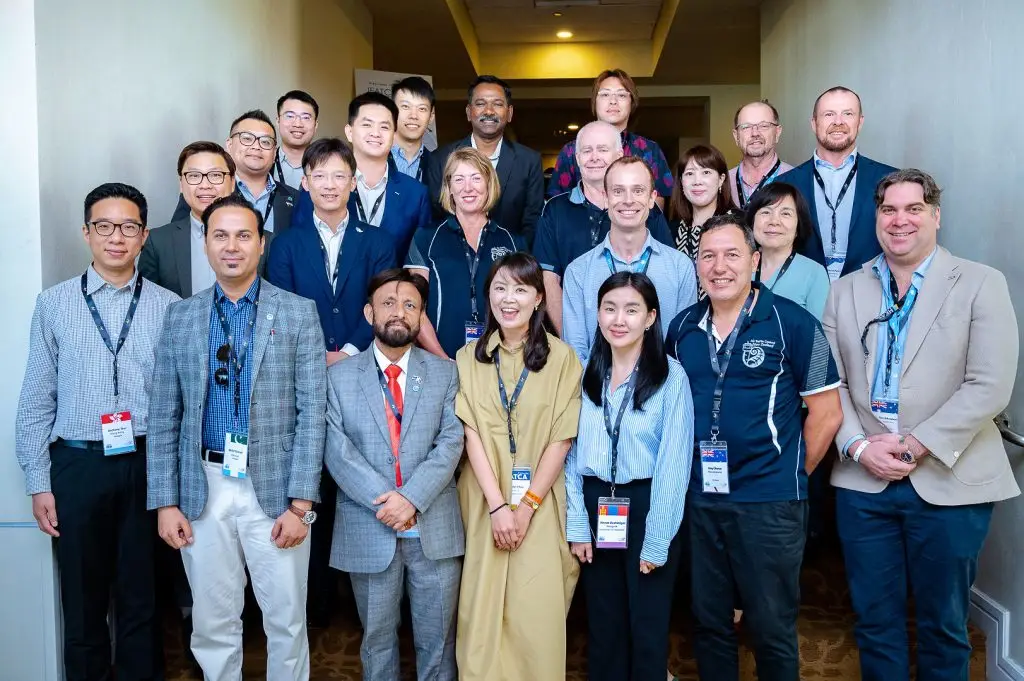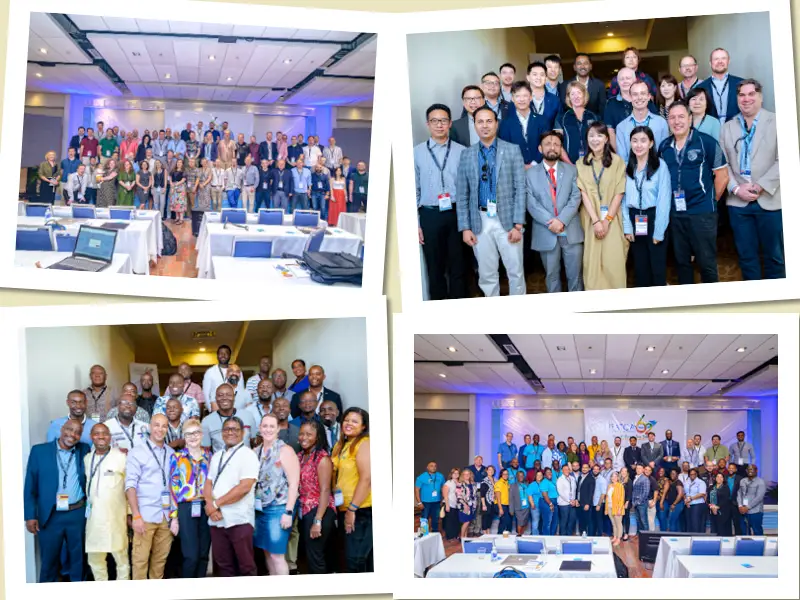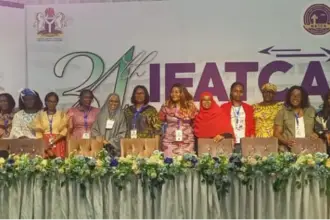Jump to:
AFRICA & MIDDLE EAST

The AFM informal regional meeting welcomed eleven (out of 49) Member Associations from the region. As usual, the aim was to give an update on the regional work and to learn about issues affected the different countries/associations.
In his opening remarks, the EVP Africa & Middle East, Mr Fateh Bekhti, extended a warm to the participants attending the annual conference., He highlighted the difficulties faced by members in obtaining the required visas to travel to Jamaica, as well as the high airfare costs. These challenges hindered the participation of many members and highlighted the need for continued advocacy and support in facilitating travel arrangements for future events.
He also emphasized the importance of effective communication and involvement within the region, asking Directors to support the development and coordination of the region actively. By fostering stronger collaboration and engagement, the region could address common challenges and work towards collective growth.
The meeting recognised the efforts made by the Ghana Air Traffic Controllers Association to attend the Annual Conference with no less than 16 delegates, which demonstrated the commitment of GHATCA to foster collaboration and knowledge-sharing among AFM members. GHATCA representatives shared their experiences and insights on overcoming logistical challenges and maximizing participation in such events.
The meeting also addressed the significance of proxies, emphasizing their role in ensuring a quorum for decision-making and voting processes. The EVP AFM encouraged Directors to support AFM MAs in facilitating proxy arrangements and maintaining active organisational engagement. By strengthening MA involvement, the AFM community could effectively address industry-wide concerns and advocate for necessary changes.
IFATCA’S EVP Finance, Mr Mark Taylor, emphasized the availability of several financial support mechanisms that are available to MAs. For this conference, the Executive Board approved nine applications for funding. He outlined the procedure for applying for these funds, and the delegates discussed ways of streamlining the reimbursement process and improving the overall efficiency of fund management.
IFATCA’s President and CEO, Mr Duncan Auld, suggested the establishment of a regional fund. He highlighted that having a regional fund would allow MAs to access funds for their activities. This approach would enable MAs to utilize funds within the region and facilitate the seamless flow of financial support.
The Federation’s EVP Professional, Mr Peter Van Rooyen, informed participants about the various training programs offered by IFATCA. He emphasized how MAs can benefit from these comprehensive training packages. The programs aim to enhance the professional skills and knowledge of air traffic controllers, ultimately contributing to safer and more efficient air traffic management practices.
The meeting ended with the RVP North Africa, Mr Djamel Ait Abdelmalek, giving an overview of the next regional meeting venue in Algeria. He shared the arrangements made by the host association to ensure a successful and productive gathering of AFM participants.
AMERICAS

With more than half the room at an annual conference for the first time, the following member associations (MA) were in attendance: Argentina, Bahamas, Barbados, Canada, Chile, Costa Rica, Dominican Republic, Guyana, Jamaica, Mexico, Panama, St. Lucia, Trinidad and Tobago, United States, and Uruguay.
EVP Americas (AMA) started the meeting by requesting attendees to review of the IFATCA Code of Conduct and expressing that all attendees should feel safe, respected, and valued when participating in IFATCA events and meetings. She referred any of Code of Conduct issues to Rossana Croci Reyes, AMA EDI-TF member. She briefly introduced herself and the attending RVPs. Joining her at the head table were RVPs Ramon Armora – Northern Caribbean and Ameer Chattergoon – Southern Caribbean. Unable to attend but sorely missed was Mario Librán – South America RVP.
MAs then briefly introduced themselves and highlighted the top two or three air traffic challenges in their respective countries. All MAs indicated air traffic controller staffing as a problem, if not dire, in their air navigation system while air traffic, for most, has returned to pre-pandemic levels or higher.
Other issues included: labour relations/collective bargaining, funding, training (including OJTI and refresher), ageing workforce, medical ins., salaries, pensions, schedules/rosters, fatigue, mental health, general working conditions, infrastructure, new construction, unreliable frequency/radar/other equipment, redistribution of the workforce, Voluntary Safety Reporting Program (establishment), governmental coordination, strike potential, ANSP leadership void, transportation to/from ATC unit and new entrants.
EVP AMA introduced our friend and colleague from the International Transport Workers’ Federation (ITF), Emiliano Addisi, explaining the important relationship and collaboration between IFATCA and ITF – professional and industrial.
Staffing
Two working papers (WPs) on staffing were submitted to the conference. Michelle Trudeau from the PLC presented the PLC WP, and El-Kadur and Joel from the Dominican Republic presented the DR WP to the regional meeting attendees for discussion.
The global short staffing of ATCOs has resulted in other mitigations such as excessive traffic management initiatives, ATCOs working overtime (even with OT pay, ATM preference fiscally to pay OT rather than have more personnel), returning retirees, betting on technological solutions to replace or allay fewer ATCOs, and mobile ATCOs.
There was significant debate and discussion on the concept of mobile ATCOs (shifting an ATCO from a surplus facility to a shorter one). Concerns centred around simply shifting the problem elsewhere, the possibility of wealthier countries taking ATCOs from other countries, leaving them even shorter staffed, training, fatigue, and mental health.
The DR WP primarily focused on retention as the workforce ages and the new generation’s expectation for better conditions. The DR MA is pursuing better salaries, insurance, and pensions to retain a quality workforce, as many are leaving the profession for more suitable conditions. Compensation packages are so low that many ATCOs have second or third jobs.
The U.S. shared their process for addressing staffing. Background: In the last 12-15 years, the FAA established target numbers for each facility. The FAA used its modelling tool to generate those numbers, which is primarily driven by money/budget. Their goal was to reduce the number of personnel while having them work more and more aircraft. About 10 years ago, a collaborative workgroup (including NATCA) was established to review those target numbers based on operational demands (how many positions need to be staffed to work aircraft properly and safely). The FAA and NATCA at the facility level assessed each individual facility. Each facility was given their 90% busiest day to assess what needed to be staffed. The data provided was sent to a national work group that verified and cross-checked it. Then a variety of factors or assumptions were factored in, for example, break/mealtime, vacation time, sick leave, two people on an overnight shift, etc.)
The aggregate number of CPCs 10 years ago was just under 13,000. Things have changed in 10 years- new airlines, schools, considerations, and those numbers are now stale. A new work group with FAA, NATCA, and an independent third party – MITRE was established. Now new numbers have been set for the facilities. The numbers were just released, and NATCA is working to include it in the report the FAA sends to Congress (Controller Workforce Plan). When Congress relies on those numbers, then additional funding should be allocated. This will help with staffing, training, and retention. The revised numbers are now over 14,500.
Bahamas Regional Meeting Update
BATCU updated the region on plans for the regional meeting 2023 in Nassau, Bahamas. They sent promotional videos to the regional attendee WhatsApp group. They are still deciding between two resorts and in discussions to get the best rates. There are potential additional alternate hotels within close proximity. The dates are 25-27 October. It will be the 50th anniversary of independence celebrations so full celebration mode during our time there. The Bahamas government has declared October 20-27 as aviation week. The website updates are coming soon. Vaccine requirements will be researched and posted.
There was a survey for the last regional meeting to see what MAs wanted to see on the agenda – expect that again ahead of future meetings.
Election of Regional Executive Vice President at Regional Meeting
In Committee A, there is a WP on electing regional EVPs at the regional meeting rather than the global conference. The regional EVP-elect would have a transition time until the spring the following year until the world conference. The shift toward voting in regional meetings for EVP was discussed. One consideration was funding. It could mean a second person travelling to attend meetings. They could, however, shadow or transition virtually. The position for support is more MAs can attend regional meetings, so electing their EB member there gives a stronger voice to the region. NOTE: This WP was passed later in the week in Committee A. EVP AMA reminded the region that RVPS will also be elected at the 2023 regional meeting this year.
EVP Professional
The EVP Professional joined the regional meeting and reminded attendees about the expression of interest for the new training task force that will be established.
He also encouraged all MAs to fill out the IFATCA Information Handbook (IHB) so that the Federation and the other MAs have updated information on important data. Canada suggested that a section be added to allow insertion of the date the form was last updated.
Finally, he updated on the current state of IFATCA workshops. Think Safety (working on standardization), ICAO competency-based training and assessment (syllabus and curriculum in place), CISM, English Language Proficiency (developing a better syllabus and curriculum), and CISM. He also briefly mentioned the Speak English Program (SEP), which is very popular with little cost to IFATCA or attendees. It is an organized way to meet virtually to speak and practice English.
ASIA/PACIFIC

This year, 22 delegates from 9 MAs in the Asia/Pacific region made it to the Annual Conference. This is the very first annual conference since the interruption by COVID-19, and for many delegated, it was also their very first IFATCA annual conference experience.
The sub-regional meeting started with the EVP ASP Cheryl Chen opening the meeting. Cheryl summarized the highlights of the upcoming conference, including a quick reminder of the voting rules and procedure, a review of the conference working papers, a thank you notes to all the delegates who have voluntarily contributed their time and efforts to IFATCA work over the years, and an encouragement to all the MAs for taking part in IFATCA’s committees and task forces.
The three regional VPs, Nainaa for North East Asia, Greg for Pacific, and De Wei for South East Asia, gave a summary of their work done and plans for the region.
The member associations attending then gave five-minute updates on their associations’ and ANSPs’ recent work and activities.
A few points raised by several times during the MAs’ reports were:
- The use of unmanned aircraft systems in the future and how to regulate this. Japan will be hosting world EXPO in 2025, and is expecting the use of air mobility and drone to be a big challenge for them.
- Staffing issues, training, digital towers, PANS/CISM, and climate change issues are common concerns among the MAs. The VPs will plan events to assist the MAs in sharing information on these topics, and MAs are encouraged to assist each other through experience sharing.
- Making ATC visible is the goal of the year. Many MAs have started their social and exchange program with other stakeholders in the industry.
Upcoming plan for Asia Pacific Regional Meeting:
- This year, the APRM will be hosted by Indonesia Air Traffic Controllers’ Association in Bali. The dates are yet to be confirmed and will be announced soon after IATCA complete their annual conference.
- India has offered and agreed by the MAs to be the host for 2024 APRM.
- Japan is planning to host the one in 2026, and we are looking for volunteers for the APRM in 2025.
Acknowledgement to ASP’s volunteers in IFATCA’s work:
- Nyamgerel Dashdolgor (Nainaa) – Co-Chair for Committee C
- Nyamgerel Dashdolgor (Nainaa) and Lim De Wei – ASP rep in 2030 Task Force
- Greg Okeroa – ASP rep in Equity Diversity and Inclusive Task Force
- David Perks – Chair of Professional & Legal Committee (PLC) and IFATCA rep to ICAO Separation and Airspace Safety Panel
- Rick Taylor – IFATCA rep to ICAO Air Traffic Management Operations Panel
- Lim De Wei- IFATCA rep to Air Traffic Management Requirements and Performance Panel
- Robert Mason – Chair of Constitution and Administration Committee
- De Wei(Singapore), Nainaa(Mongolia), Cheryl (Taiwan), Anthony (Singapore), Hamid(Iran), Angel(Taiwan), Bara (Indonesia), Mohammad (Iran), Chun Kim(Singapore), Mehdi (Iran), Renz (Philippines), Linda (Indonesia) – facilitators for IFATCA Speak English Program
EUROPE

A good portion of the meeting was dedicated to the future strategy for the European region and how this relates to the overall ideas coming from the IFATCA2030+ Task Force.
The European Member associations also discussed the way ahead with the support of our Ukrainian colleagues. While it was never planned to last this long, the need remains, and funds remain to help those in need until at least August. This is, of course, heavily dependent on how the situation continues to develop. Eight MAs indicated they were willing to continue actively supporting the fund, with a number stating they would need to check. No doubt that the situation will need to be discussed again at the regional meeting in Riga.
The Swiss delegation presented a project in which they are partnering with their ANSP. A new regulation from the Swiss government will raise the retirement age. The project will study how to increase the retirement age without impacting safety. The interesting presentation generated quite a bit of healthy discussion, not in the least as many questions remain on whether this can be done safely in all environments and/or what compromises are needed.
Individual Member Associations presented their specific issues. While many continue to struggle with understaffing, the war in Ukraine has also resulted in dramatically changed flows for some Member Associations. With traffic to and from Russia nearly disappearing, some ANSPs face overstaffing and want to dramatically reduce their staffing. Military operations also add complexity.
Topics and Suggestions for ERM2023 included staffing issues, particularly how to avoid the incoming wave of retirements in some countries. Fatigue was another topic that could make for an interesting workshop, also in the light of a recent EUROCONTROL study. One association suggested privatisation as they face government plans to sell-off portions or all of their service provision to private industries.












